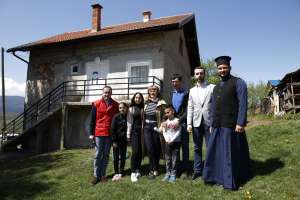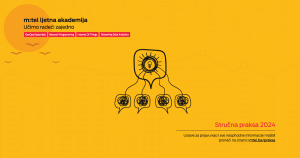SARAJEVO, July 15 (FENA) - The United Nations Assistant High Commissioner for Protection, Gillian Triggs paid a visit to Bosnia and Herzegovina, where she spoke with BiH officials duties and visited three reception centers where refugees are accommodated, in Bihać, Lipa and the reception center Ušivak near Sarajevo.
As she said in an interview with FENA, Bosnia and Herzegovina, despite the difficult position of the authorities since tens of thousands of people passed through the country with no intention of staying, still provided protection for them, which was UNHCR's biggest concern, and that is that they have shelter, food and health care.
"We are very aware of the responsibility that is on Bosnia and Herzegovina and the responsibility that should be shared among other countries in the region and beyond," said Triggs.
He also says that some of the centers are very well organized, such as Ušivak, where refugees have all the services, while the Lipa camp still lacks a lot.
Triggs points out that the pandemic has had a major impact on those seeking international protection by fleeing violence or persecution as countries have closed borders to protect public health to which as sovereign states they have an absolute right.
"But the consequences for refugees and asylum seekers are such that they are unable to exercise their rights. Many people come here in BiH and there is an asylum system that works, although it is slow, but Covid-19 has definitely affected asylum seekers," she explained.
The United Nations agencies are available to support governments in speeding up the identification of these people and the asylum process in general, Triggs said, because anyone passing through BiH can apply for asylum, but it is true that most do not want to stay in BiH.
Most of those who pass through BiH are not asylum seekers or refugees, they are migrants and BiH has a sovereign right to treat them as migrants, respecting their human rights, Triggs said. The challenge, therefore, is even greater as 72,000 people have passed through BiH in recent years and all claim to want asylum.
"Our biggest challenge is to identify those who really want to stay because there is a relatively small number of those who need international protection, which is why we would like to work more with the authorities in the coming months on this issue," Triggs underlined.
Also, the intention is to work with those who want to stay in BiH in order to better integrate into BiH society, have the opportunity for employment, so that they could access health care and enroll children in schools, and then they could contribute to the BiH economy.
Currently, those who want to stay in BiH have been waiting for years for their asylum application to be resolved, which is why they cannot even begin the process of integration into BiH society and this puts them in a very unfavorable position, which is why it is important to make the system more efficient and implement laws and international legislation.
The process of integration into BiH society might be easier in Bosnia and Herzegovina, given that almost half of the population of BiH fled to other countries during the war of the 1990s, which is why there is a certain kind of empathy for refugees, which is not the case with some other countries.
"In order to achieve this, it is necessary to have a determined political leadership that will prohibit discrimination, hate speech and build compassion among the local population in order for them to integrate into society," Triggs added.
The UN Assistant High Commissioner for Protection Gillian Triggs says BiH has made progress in addressing statelessness, but there are about 100 people who live in BiH and who are stateless or at risk of becoming stateless.
The issue of these people needs to be resolved before December this year when a meeting will be organized to discuss progress in the field of statelessness in the signatory countries of the Convention and to achieve the ultimate goal of complete eradication of the problem of statelessness.
"It would be a great pleasure for us if the BiH representatives would come to that meeting in Geneva and announce that they have completed that work and that there are no more stateless persons in the country. That would be a great achievement since BiH continues to be the leader in the region when it comes to this issue," said Triggs.
"If you look at those numbers alone, it could rightly be said that the Convention had not been effective, but its efficiency is reflected in two fundamental principles. According to her, everyone has the right to seek asylum, and the other refers to the fact that no one should ever be returned from the border of another country if they are fleeing war or persecution," Triggs underlined.
But in recent years, especially during the coronavirus pandemic, we have witnessed non-compliance with these principles, and people are increasingly being subjected to pushback from borders either at sea or on land, which is a concern to UN agencies.
"Also, more and more countries are denying people the right to apply for asylum. Our job in the future is to warn and work with governments to ensure that they remain committed to these principles because today BiH may offer such protection while later people in BiH may need the same support from other countries as we live in very volatile times," said Triggs.
This year, UNHCR, the UN refugee agency, is celebrating the 70th anniversary of the Refugee Convention, which emerged six years after World War II and, at the time, covered about two million refugees, while today we are talking about the figure of 82 million displaced persons.
As the Assistant United Nations High Commissioner for Refugees for International Protection Gillian Triggs concluded in an interview with FENA, things need to be viewed globally and at the multilateral level, because that is the only way to solve these challenges at the global level.
Bosnia and Herzegovina is a signatory to the 1951 Refugee Convention, which prescribes obligations towards people forced to flee war or persecution. With the support of UNHCR, Bosnia and Herzegovina has built a legal framework designed to ensure compliance with international standards of protection.
Watch https://fena.ba/video/6203/
Download https://drive.google.com/drive/folders/1rW-zq18LijGytLDskn2GkvIBHnmL_Wf-?usp=sharing
(FENA) S. R.









